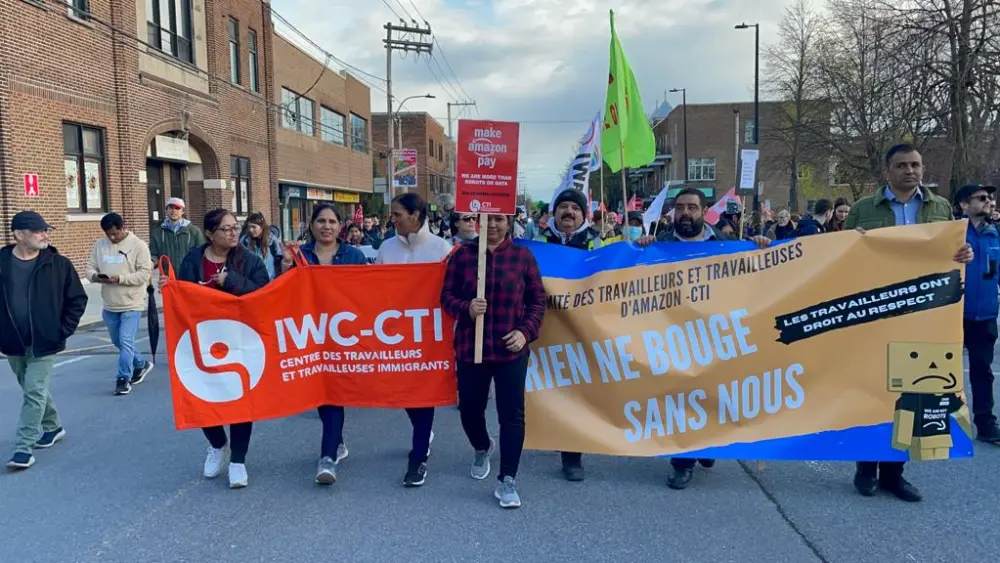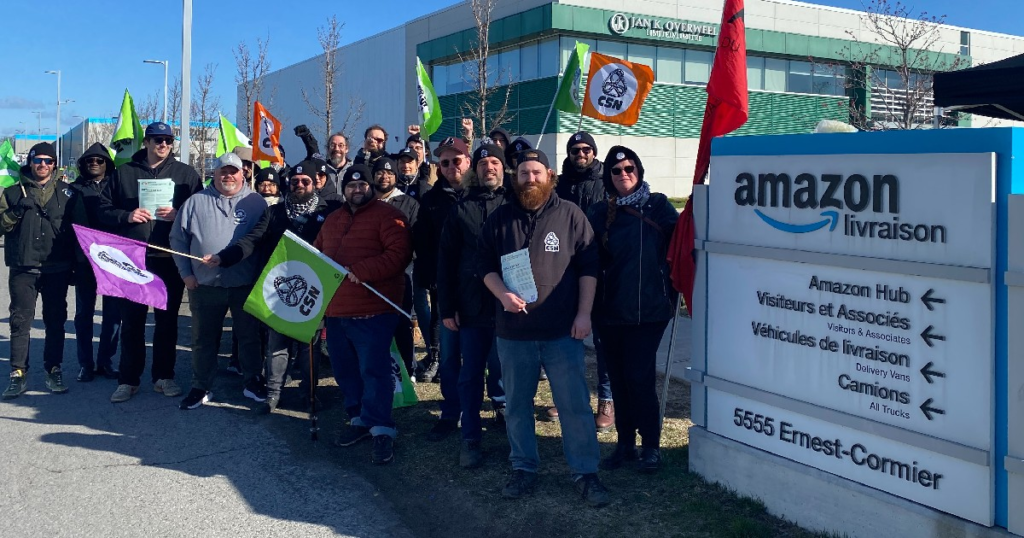A coalition of workers and researchers has issued a damning report on working conditions in Amazon warehouses in the Montreal area. It comes one year after Amazon workers pleaded with Quebec's workplace health and safety regulator for an inquiry and for reforms to address unsafe working conditions in Amazon's warehouses.
The research underlying the report was led by the Immigrant Workers Centre and GIREPS, an academic group which studies issues of labour, poverty, and social protection. The report revealed that 60% of Amazon workers suffer musculoskeletal disorders and that 55% of Amazon workers have witnessed or experience a workplace injury.
At a June 28 press conference, members of the Immigrant Workers Centre's Montreal Amazon Worker Committee, the Union of Injured or Ill Workers of Montreal and several academic experts demanded improvements to workplace health and safety. The press conference was held in front of the CNESST, the Quebec body responsible for enforcing workplace health and safety norms.
Mostafa Henaway, an organizer with the Immigrant Workers Centre, explained the history of the campaign:
"The press conference today comes one year after Montreal Amazon Worker Committee members, so different Amazon workers who are active and leaders in the committee, went to Quebec City and demanded a meeting with Labour Minister Jean Boulay to demand, one, a public inquiry, but to demand real reform around quotas, around work conditions, around the way workers' complaints are being treated from Amazon by the CNESST and to really just denounce the conditions."
In addition to decrying the government's inaction, the coalition denounced Amazon's high productivity demands which, along with inadequate training and lack of protective equipment, systematically pushed workers beyond their limits, leaving them injured.

Benoît, a union organizer and former Amazon worker who incurred an injury on the job, told North Star that Amazon workers, many of them young people and recent immigrants, face significant bureaucratic challenges when trying to report their injuries to the CNESST and to Amazon management.
He explained the long-term effects of Amazon's working conditions on warehouse staff:
"Eventually, a lot of people end up leaving Amazon or getting fired because they can't work anymore. They don't have any money. You've been injured for three weeks. You've had absolutely no medical follow-up, no recognition of your injury. Now you've got to find a new job, but you're still injured. That's what the statistics don't say. That's what happens with all these colleagues I've seen who disappear from one day to the next without explanation. Where are they going to find a job in another warehouse?"
For Henaway, government inaction on health and safety in Amazon warehouses goes beyond inaction at the CNESST.
"Amazon lobbies the most out of any other corporation. In any given year, it's requested over 160 meetings with different government departments. A lot of that has to deal with AWS, Amazon Web Services, getting government contracts, facilitating subsidies for their data centres. But this goes hand in hand [with the promise that] 'We'll provide good jobs in terms of our fulfillment centres if you give us tax breaks on Amazon Web Services, or you take the contract, or you allow us to open up a data centre with cheap hydroelectricity.' [...] Amazon is really relying on the government in all kinds of ways. [...] It obviously negotiates at the municipal level, negotiates at the provincial level, and negotiates at the federal level."

In recent years, there has been a groundswell of unionization efforts by Amazon workers in the Montreal area and beyond. Henaway believes this could have a strong impact on working conditions in the retail giant's warehouses:
"I think the real battle is going to come when workers say, 'We're not doing 200 an hour. We want to do 150 packages an hour.' [...] Right now, Amazon doesn't want to negotiate with workers, right? [...] So they actually don't want to relinquish any power, but at the end of the day, they're actually now forced to deal with the workers."